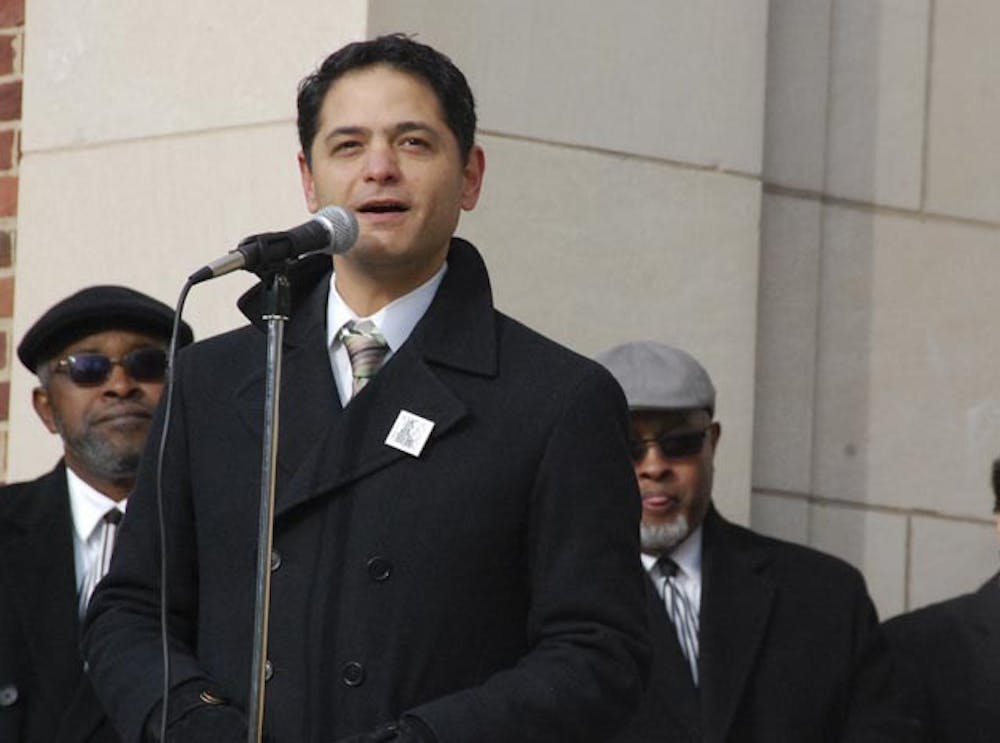The rally was followed by a march from the post office to First Baptist Church for an 11 a.m. service.
Former national NAACP president and long-time activist Benjamin Chavis was the keynote speaker. Chavis is the central figure in Timothy Tyson’s book “Blood Done Sign My Name,” which talks about the murder of a young black man in Oxford, N.C., in 1970.
- Jamie Emmerman
A Day of Service
Senior Lindsay Smith’s mother worked during the Civil Rights era to integrate her high school.
And on Monday, to honor her legacy during the Martin Luther King Jr. Day for Service, Smith was one of hundreds of students to take an active approach to the holiday.
“The purpose of today wasn’t to sleep, but it was to honor his legacy and help others reduce injustices,” said senior Lindsay Smith, who was one of many involved during Carolina Rejuvenating Our Community Through Service’s 10th annual MLK Day for Service.
Before Smith left to refinish wooden chairs for the United Way of the Greater Triangle, she and the hundreds of other volunteers for various projects were thanked by Terri Houston, interim associate provost of diversity and multicultural affairs, for their service.
“You are about to literally change and impact someone’s life,” she said.
“The challenge that you face makes a difference to the lives that you touch.”
More than 350 student volunteers represented the event’s highest turnout yet, said Marquise Hudson, president of the service group.
Volunteers were dispatched to 16 different sites operated by several organizations, including A Helping Hand, Meals on Wheels, Orange County Red Cross and the Ronald McDonald House.
To get the day's news and headlines in your inbox each morning, sign up for our email newsletters.
Almost 100 student volunteers were sent to another project sponsored by the United Way at Christ United Methodist Church. They worked on various tasks including refinishing rocking chairs, restoring computers and making Valentine’s Day cards for veterans.
This is the sixth year United Way has sponsored a project. In those six years, Craig Chancellor, chief executive officer of United Way of the Greater Triangle, said the project has come a long way.
“It started small, but it’s a tremendous way to celebrate Dr. King’s legacy because this is what he’s about,” Chancellor said.
Several students volunteering at a project sponsored by A Helping Hand helped make valentines for senior citizens. Roughly 4,000 have been made already.
Cathy Ahrendsen, founder and executive director of A Helping Hand, said she was inspired by her grandmother to start a nonprofit organization 15 years ago. It has grown to serve about 400 clients each year.
These clients are usually senior citizens and disabled people.
Several of these students were a part of the UNITAS program, a living and learning community dedicated to encouraging understanding among students of diverse backgrounds.
“As a part of the living and learning community, we commemorate and continue Martin Luther King’s legacy of empowerment,” said freshman Vishalee Patel.
Senior Shuronia Johnson, a student volunteer, said she valued the ideals of Martin Luther King Jr. and expressed her desire to continue his legacy through her service.
“Since Martin Luther King did a whole lot for the community, I felt I should follow in his footsteps and give back to the community,” she said.
“I believe that a day of service should not just be today, but every day.”
- Kaitlyn Knepp and Sarayu Kumar
“He was a Poem”
In spite of the rainy weather, the theatre at the Sonja Haynes Stone Center for Black Culture and History was saturated on Monday with people eager to celebrate Martin Luther King Jr. Day not through service, but through an artistic appreciation of the struggle for equality.
Through “He Was a Poem, He Was a Song,” students and other members of the University community appreciated the poetry, essays and musical tributes of black culture.
“We have come forward in interesting ways, and we still have work to do,” said Dr. L. Teresa Church, who performed two spoken art pieces. “Without this holiday, reminding us of that, we might too easily forget.”
Denise Mitchell, a junior psychology major, said King’s message of equality persists through time.
“What Dr. King stood for is timeless,” Mitchell said. “I feel like it’s not only my duty to continue his legacy but to spread it to others.”
Joseph Jordan, the center’s director and emcee of the event, said the day felt like the culmination of years of work.
“There’s still economic inequality,” Jordan said. “There’s racial inequality. There’s gender inequality. And it still manifests itself right here at UNC’s campus, so you have to continue to fight wherever you are.”
- Jessica Kennedy




